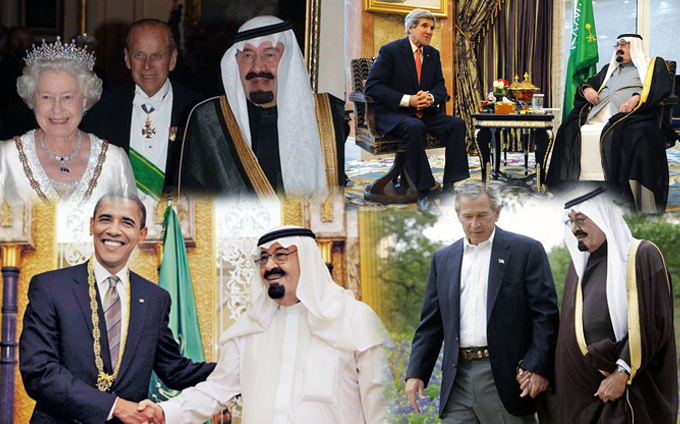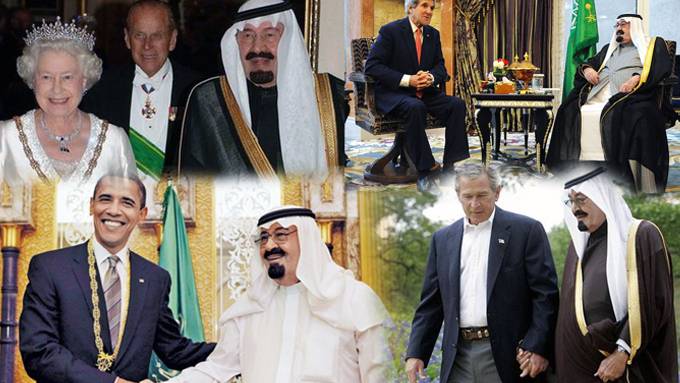West’s tributes to late Saudi King reveal hypocrisy not democracy
Source: rt.com

Hypocrisy is not usually regarded as a virtue of leadership, yet judging by the gushing tributes paid to Saudi Arabia’s King Abdullah by various Western governments and establishment figures on his death, there are those who believe it should be.
In the UK this hypocrisy has been stretched to breaking point with the decision to fly the flags over Downing Street, Buckingham Palace, and Westminster Abbey at half-mast in tribute to Abdullah. It was a decision met with revulsion by all right thinking people.
Let us be frank for a moment. Given the barbarous and medieval nature of Saudi Arabia, a country in which public beheadings, hangings, floggings, and torture are routinely carried out , given the role of the Saudis in fomenting and funding carnage and mayhem across the Middle East, and given the lack of human rights afforded its citizens, particularly women, few tears should be shed over King Abdullah’s passing.
Anyone watching the footage of the Burmese woman being held down and beheaded by four men in Mecca recently, even as she begged for her life, could not feel anything except overwhelming disgust that such atrocities could take place anywhere and be considered justice in the year 2015. And she is just one of the nine people who have been beheaded in Saudi Arabia in January alone, suggesting an intention on the part of the country’s authorities to exceed the 83 victims of this barbaric practice in 2014.
If this is the fruit of King Abdullah’s much vaunted ‘modernizing’ influence then the word is obviously bankrupt of all meaning.
How can it be that the West is on the one hand fighting ISIS and its butchery in Iraq and Syria, while on the other maintaining the closest of economic, strategic, and political relations with a government that practices the same butchery on a regular basis?
The answer, of course, is money.
When it comes to the Kingdom of Saudi Arabia, however, money fails to bridge the chasm between basic human decency and the rank opportunism and venality of Western leaders and their proxies. Just consider, for example, the words of Tony Blair, a man who never misses an opportunity to remind us of his perverse worldview. He said of Abdullah, “I knew him well and admired him greatly.”
This comes as little surprise when we consider Blair’s close ties to the Saudis, which in 2010 included a controversial role brokering deals between the Saudi oil company, PetroSaudi, and senior Chinese officials, netting him a fee of £41,000 per month and a two percent commission on each transaction.
As for current British Prime Minister, David Cameron, he was minded to announce, “He [King Abdullah] will be remembered for his long years of service to the kingdom, for his commitment to peace and for strengthening understanding between faiths.”
Abdullah’s ‘commitment to peace’ will come as a huge surprise, not to mention sick joke, to the people of Syria and Iraq, who’ve seen their societies turned upside down by medieval butchers who have benefited from the patronage of Saudi Arabia and its supporters these past few years. But, then again, we only have to consider the fact that Saudi Arabia is the largest and most lucrative export market for the British arms industry to understand the praise lavished on the dead king and the Saudis by Mr. Cameron, who travelled to Riyadh to pay tribute in person. He was joined there by Prince Charles, a regular visitor to the Kingdom over the years, and French President Francois Hollande. Mr. Hollande, it should be recalled, just led a mass rally in Paris against Islamist extremism and terrorism in the wake of the recent massacre in Paris. Now here he is arriving in a country implicated in supporting and funding extremism and terrorism to pay homage to its dead king. You really couldn’t make it up.
US President Barack Obama, meanwhile, offered his condolences in the manner of the leader of a nation whose ties to the oil rich kingdom have endured over decades.
Witnessing these self-proclaimed champions of democracy and human rights competing to outdo one another in their praise of a man for whom those very words were deemed an insult has been nauseating. The Saudi monarchy is absolutist, corrupt, and dripping in the blood of both its own people and people beyond its borders. As such, if there existed in the West governments underpinned by anything resembling ethics and principles, the response to the death of King Abdullah would have been similar to the words attributed to the Roman senator Marcus Brutus by Shakespeare, “I come to bury Caesar, not to praise him.”
Saudi Arabia is a country crying out for revolution. It has played a major role in destabilizing the Middle East over the past decade - helping to murder democracy in Bahrain, working to demonize and isolate Iran, and supporting the ongoing attempt to destroy Syria. This is why with its support and ties to the Kingdom the mask of democracy in the West has been removed to reveal organized hypocrisy.
Source: rt.com
Saudi Arabia: King Abdullah DEAD, Time For Revolution?
Article by Stuart J. Hooper | 21stcenturywire.com
While undergoing treatment for pneumonia, Saudi Arabia’s King Abdullah bin Abdulaziz has died. Crown Prince Salman has been named as the new King.
This event comes at a challenging time for Saudi Arabia. Oil prices are dive bombing and it is widely understood that the Kingdom can only sustain such low rates for a certain period of time, before it approaches economic catastrophe. Saudi Arabia is what is known as a ‘Swing State‘, meaning that it has the ability to swing the price of oil, literally overnight, by either cutting or enhancing production by around two million barrels of oil per day. It is believed that U.S. pressure, the de facto driver of Saudi foreign policy, is swinging the price down in an attempt to subsequently attack Russia’s oil-dependent economy; after it has failed to do so on all other fronts.
The Saudi Royal Family is known to suffer from fierce internal rivalries and power struggles. The loss of a leader, although somewhat expected, still, opens the door to political conflict. The likelihood of political conflict occurring in Saudi Arabia is therefore at an all time high if the aforementioned economic problems begin to become a prominent issue.
These economic problems run parallel with legitimacy problems currently facing the House of Saud. The recent flogging of a Saudi Arabian blogger, who questioned said legitimacy, has received vast international attention and posits the Kingdom for domestic upheaval. Saudi Arabia’s legitimacy issues fall back to its claim to be the true representation, and defender, of Islam. This claim was initially challenged by the 1979 Iranian Revolution, which saw a new state, namely Iran, lay claim to such a position. So while Saudi Arabia and Israel may appear to be strange bedfellows, they both have a common enemy in Iran; an external actor that may look to take advantage of the Kingdom’s negative geopolitical situation.
If there was ever a case for an ‘Arab Spring‘, Saudi Arabia would be a prime candidate. Refusing to sign onto the UN Declaration of Human Rights has led to vast humanitarian issues concerning torture, execution, corporal punishment and equal rights for all; so Saudi Arabia certainly appears to be in need of domestic change. Will a political faction within the Kingdom take advantage of the currently negative geopolitical situation facing Saudi Arabia’s rulers? Or will an external, foreign faction look for change covertly?
[...]
Read the rest: 21stcenturywire.com






















